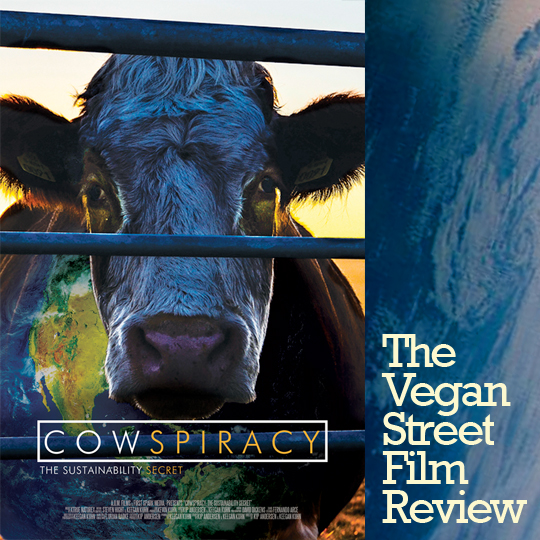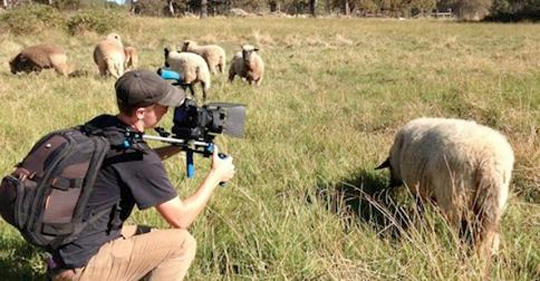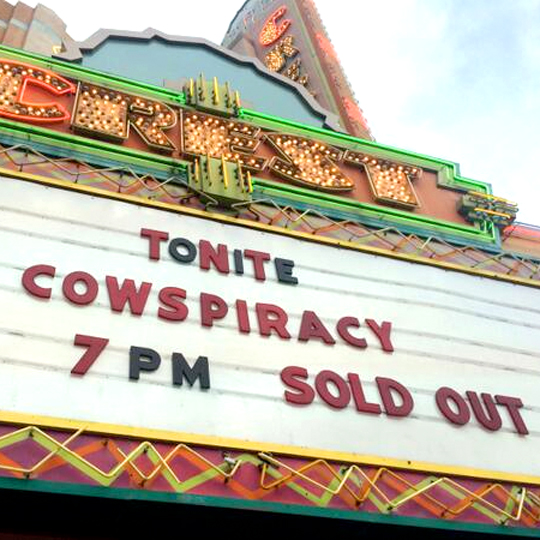
If you would prefer a printed softbound version of When Vegans (Almost) Rule the World, you can pick one up for just $11.99 at Amazon. Kindle eBook coming soon!

Available in either softbound or Kindle/Nook/etc. eBook at Amazon
viviansharpe.com

  Film Review: Cowspiracy directed by Kip Andersen and Keegan Kuhn In July, I was lucky enough to be at one of the first screenings of the new documentary Cowspiracy: The Sustainability Secret when it was brought to Vegetarian Summerfest. The question that drives the arc of its action - Why don’t the leading environmental organizations acknowledge that consuming animals is the single biggest driver of ecological destruction? - is one that has vexed vegans for years. Why is there this elephant in the room when there is a growing and increasingly persuasive body of evidence that animal agribusiness is the leading environmental disaster caused by humans? From water pollution and depletion to greenhouse gas emissions, habitat destruction to dead zones in our oceans, consuming animals and animal products is the biggest contributor. Why then this deafening silence on the part of so-called environmental groups? This was the question plaguing Kip Andersen (the principal in the film and co-director, along with Keegan Kuhn) as he met with - or was avoided by - large environmental groups like the Sierra Club, Greenpeace and Rainforest Action Network, to name a few. As an avid nature lover since childhood, Al Gore’s phenomenally popular documentary “An Inconvenient Truth,” further lit a fire in Andersen to adopt changes in his personal life that could have a positive ripple effect on slowing down climate change; once he dug deeper into the subject, though, Andersen had to face his own inconvenient truth, one that so few environmentalists seem to be willing to confront themselves: the shorter showers and compact florescent lightbulbs he incorporated into his life created pretty minor net results compared to the sweeping positive changes our planet would reap from moving away from eating animals.  After learning that animal agribusiness was a greater contributor to climate change than all forms of transportation combined, Andersen was confused as to why the organizations he supported and the individuals he respected so much were virtually silent on the subject, preferring instead to focus on less immediate answers when an accessible, powerful and proven solution to so many environmental ills was readily available. Thus he began his journey to trying to understand the nearly uniform culture of blinders instituted by so many so-called environmental organizations. When Bruce Hamilton, Deputy Executive Director of the Sierra Club, waxes dystopian as he imagines the ramifications of climate change on the global world of the near future, it’s clear this is a man who knows what he’s talking about. Asked by Andersen if environmental groups shouldn’t be focusing on “livestock” production given that it is the leading cause of greenhouse gas emissions by far, though, Hamilton says, “Well, that’s your assessment. That’s not our assessment.” We can almost see a door slam shut between them, a palpable chill. To me, this moment encapsulates the deceitful evasion of the environmental movement as we watch Hamilton sidestep the opportunity to take a bold position. This is something vegan activists have been trying to create dialogue about for years with environmental organizations. “Cowspiracy” doesn’t offer an absolute answer to the question of why this culture of denial is so pervasive but offers some plausible explanations, from organizations that don’t want to alienate potential members to perhaps being poorly educated on the topic themselves. As such, it is a frustrating but ultimately illuminating lens into how these large organizations operate, what they are concerned about and what they choose to ignore. With very effective graphics throughout that make a deeply compelling case against animal agriculture, if Andersen and Kuhn cannot persuade the organizations to acknowledge reality, at the very least they can make audiences aware and ready to take positive, bold actions that the putative environmental leaders will not. Interspersed throughout with interviews with articulate vegan advocates like the very impressive Dr. Richard Oppenlander, Demosthenes Maratos, Dr. Will Tuttle and David Simon (as well as our friend, former cattle rancher Howard Lyman), we hear again and again the undeniably damning facts about animal agribusiness that the organizations refuse to address in a meaningful and unambiguous way. Given how many women are active in the vegan movement, I would have liked to see more female representation in the film - for example, Mariann Sullivan, Dawn Moncrief, Lee Hall, Mia MacDonald and Colleen Patrick-Goudreau would have all made great interview subjects to name just a relative few off the top of my head - and I was reminded again how fostering the diversity of our movement needs to become a priority. (This is not the fault or responsibility of the filmmakers, of course.) I recommend “Cowspiracy.” It is an at-times exasperating but always forthright inquiry into how environmental organizations avoid facing the inconvenient truths that may be considered unpopular views to their members. Please support this crowd-sourced film by spreading the word, attending a screening or setting up a screening yourself.  © 2013, 2014, Vegan Street |













 |
 |
 |
 |
 |
 |
 |